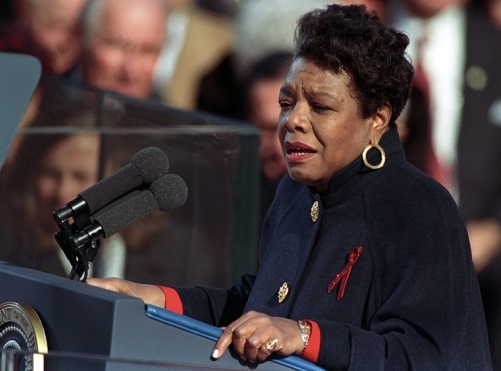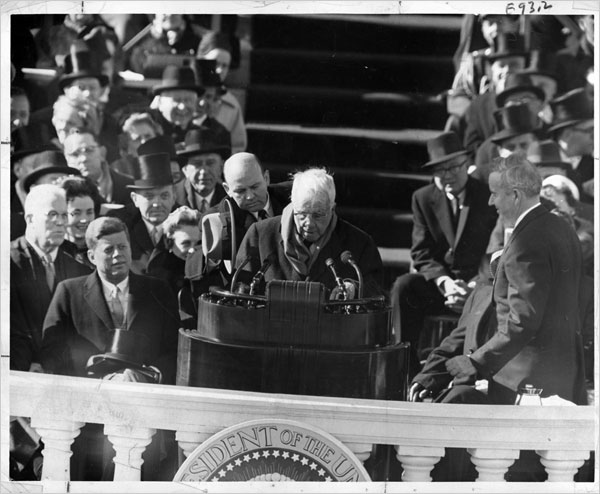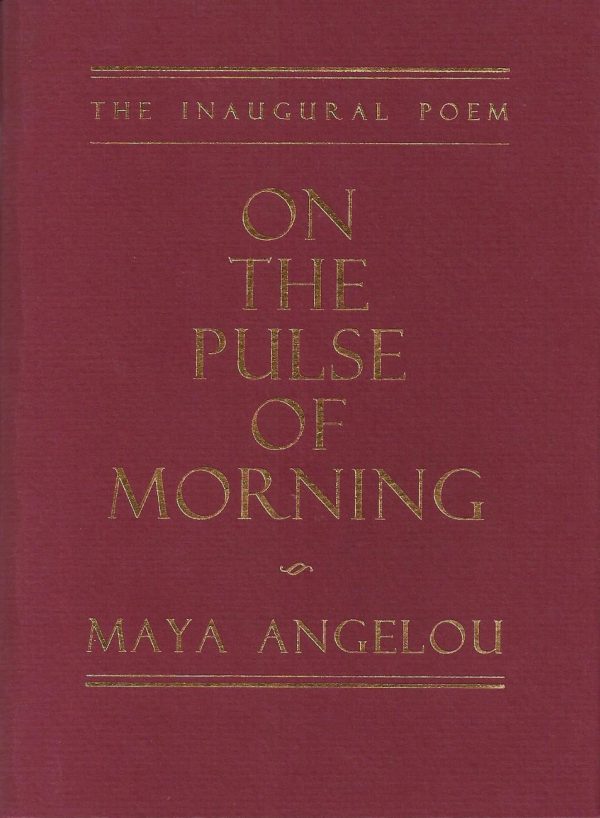 “On the Pulse of Morning” by Maya Angelou. New York, NY: Random House, 1993.
“On the Pulse of Morning” by Maya Angelou. New York, NY: Random House, 1993.
National Poetry Month was established in April 1996 to highlight the achievements of American poets, support teachers, encourage the reading and writing of poems, and increase the attention given to poetry in the media. We’ve been digging through our poetry section at Lemuria, thinking and talking about our favorite poets, and I remembered that we have a collectible edition of the late Maya Angelou’s inaugural poem “On the Pulse of Morning.”
Even though the United States has had 57 presidential inaugurations, we have had only five inaugural poems. John F. Kennedy was the first to have a famous poet read at the ceremony in 1961. Robert Frost was to read a poem called “Dedication” which he had written for the occasion with references to Kennedy’s slim victory over Nixon. When Frost looked down to read, the glare was so strong from the heavy blanket of snow that he could not see the words–even though someone tried to shield the paper with his hat. The 86-year-old Frost simply recited a poem from memory called “The Gift Outright.”

It was not until 1993 that a poem was read again. Maya Angelou read “On the Pulse of Morning” at Bill Clinton’s inauguration. In a 1993 interview with the New York Times, she said that she wanted to communicate “that as human beings we are more alike that we are unalike.” As she prepared to deliver her poem, she admitted that it was an overwhelming honor. Perhaps, Angelou knew of Frost’s trouble at Kennedy’s ceremony. She asked every one to pray for her:
“I ask everybody to pray for me all the time. Pray. Pray. Pray. Just send me some good energies. Last night I said to this group of hundreds of people, I said: ‘Pray for me please, for the inaugural poem. Not in general. Pray for me by name.’ Say: ‘Lord! Help Maya Angelou’ Don’t just say ‘Lord help six-foot-tall black ladies or poets or anything like that. Lord. Help Maya Angelou. Please!’”
So far we’ve had three more inaugural poets: Miller Williams read “Of History and Hope” at the 1997 inaugural of Bill Clinton; Elizabeth Alexander read “Praise Song for the Day” at the 2009 inaugural of Barack Obama; and Richard Blanco read “One Today” at the 2013 inaugural of Barack Obama.
Since Robert Frost’s inaugural poem, most of the poems are published in a special inaugural edition. Random House issued Maya Angelou’s “On the Pulse of Morning” in a signed limited edition of 500 numbered copies. It was also published in a pamphlet format in dark maroon wrappers. Collecting these inaugural poets is a unique way to collect poetry and a piece of American history. It is also curious to see which presidents will carry on this tradition.
This is video footage of Maya Angelou reciting her poem “On the Pulse of Morning” at the 1993 Presidential Inaugural. This footage is official public record produced by the White House Television (WHTV) crew, provided by the Clinton Presidential Library.








 is all about sharing books with the one we love. This Thursday from 5-8 at the Art Lovers’ Soiree, Maggie will have a fantastic selection of books perfect for your special someone. Here are a couple of the books she has chosen.
is all about sharing books with the one we love. This Thursday from 5-8 at the Art Lovers’ Soiree, Maggie will have a fantastic selection of books perfect for your special someone. Here are a couple of the books she has chosen.
 Penguin Classics has published a beautiful edition of The Sonnets and A Lover’s Complaint by William Shakespeare, befitting of the poetry within. We LOVE the Penguin Classics and any of them would be a great Valentine’s Day gift, but this is our all-time favorite for this occasion. Who wouldn’t swoon over this cover?
Penguin Classics has published a beautiful edition of The Sonnets and A Lover’s Complaint by William Shakespeare, befitting of the poetry within. We LOVE the Penguin Classics and any of them would be a great Valentine’s Day gift, but this is our all-time favorite for this occasion. Who wouldn’t swoon over this cover?







 In the 1942 Foreword to
In the 1942 Foreword to 


